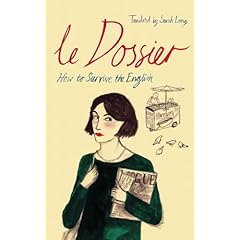
--The blurb--
"In this robust, insightful and hitherto only privately available handbook, Parisian wife and mother Hortense de Monplaisir shares with us the secrets of her survival amongst the English. Exiled to London for the sake of her husband’s career, pioneer, Hortense delves into the many aspects of la perfide Albion that have long puzzled its closest neighbour and oldest enemy. No one and nothing is safe from Hortense’s penetrating eye as she discusses a diverse range of topics from the inability of the English to speak their mind, their bizarre love of rituals such as the stag party and the country fete and their passion for long muddy walks, to their obsession with World War II, estate agents and incomprehensible fondness for the traditional English pantomime. The result is a double-edged comedy: here are the foibles of the English, seen through the jaundiced gaze of a sophisticated Parisienne. Hortense’s confident interpretations of some of our best-loved national habits (jam with meat, anyone?) will only confirm our long-held view that the French are, indeed, very different.”
blurb from http://richards-world2.the-world-in-focus.com/
--The review--
Le Dossier, narrated by Hortense de Monplaisir and translated by an Englishwoman, Sarah Long, simultaneously allows Brits to do what they do best on two counts: make fun of themselves, and make fun of the French. Hortense de Monplaisir is in fact a fictional narrator invented by Sarah Long, the 'translator', an Englishwoman who lived in Paris for ten years. It is clear from the outset that Hortense is intended to embody only a very specific Parisian demographic (the rich trophy wife), and not all French people. Long's pointed inclusion of specific detail, such as the location to which Hortense has been expatriated and her references to her regular visit to the coiffeur, makes this evident quickly. Long also assumes the persona of a French woman well, and the 'French accent' with which her character speaks rings loudly throughout the narration almost from the beginning. She makes several very accurate observations about the French as well as about the English, doing this as well implicitly as she does explicitly, and all aspects of both English and French life are well covered and tautly compared.
The positive reaction that I had to this piece of double-edged satire therefore made my perusal of Amazon's comment page very surprising: a disproportionate number of people seemed to find this novel lacking in humour, insulting, or both. The only people who felt this way clearly didn't 'get' the novel's concept, and for this to happen, in my mind, you have to be a few sandwiches short of a picnic. Hortense is crafted to the pinnacle of extremity in her actions, reactions, and thoughts, and while some of these things are representative of the French as a nation (hypochondria, anyone?), she is deliberately designed as a caricature, and as a piece of satirical comedy, the novel comes off very smoothly. It is in no way intended as a serious piece of literature, and bearing this in mind greatly aids the reader's general enjoyment.
Le Dossier combines stereotypes with wit and humour beautifully, and equally mixes disrespect and respect for both cultures. Some of the points Long makes about English culture are particularly salient, and since Le Dossier is satirical and she therefore may not mean them, it does provoke the question of why Long, who lived in Paris for ten years, returned to England; furthermore, instead of adhering to one comment on the book's cover, which assures readers that this book will change their minds if they ever decide that idyllically renovating a French château is a good idea, Le Dossier is perhaps more likely to send the English running towards France faster than ever before, for the novel is as blunt about England's faults as it is about France's. The only weakness in the novel is some slightly shoddy editing: missing footnotes, for instance, and a couple of ill-aimed accents (e.g. château being written chateâu).
Sarah Long reveals herself in the 'about the translator' section, saying 'Madame de Monplaisir, c'est moi!' I kindly instruct anyone who still misses the point of this novel after reading that preface to read the novel over again. It is a rare gem in being both amusing and true, and it is to be hoped that this will propel Ms Long and her work into the limelight, where they both deserve to belong.
Other works by Sarah Long
And What Do You Do?
The Next Best Thing





No comments:
Post a Comment